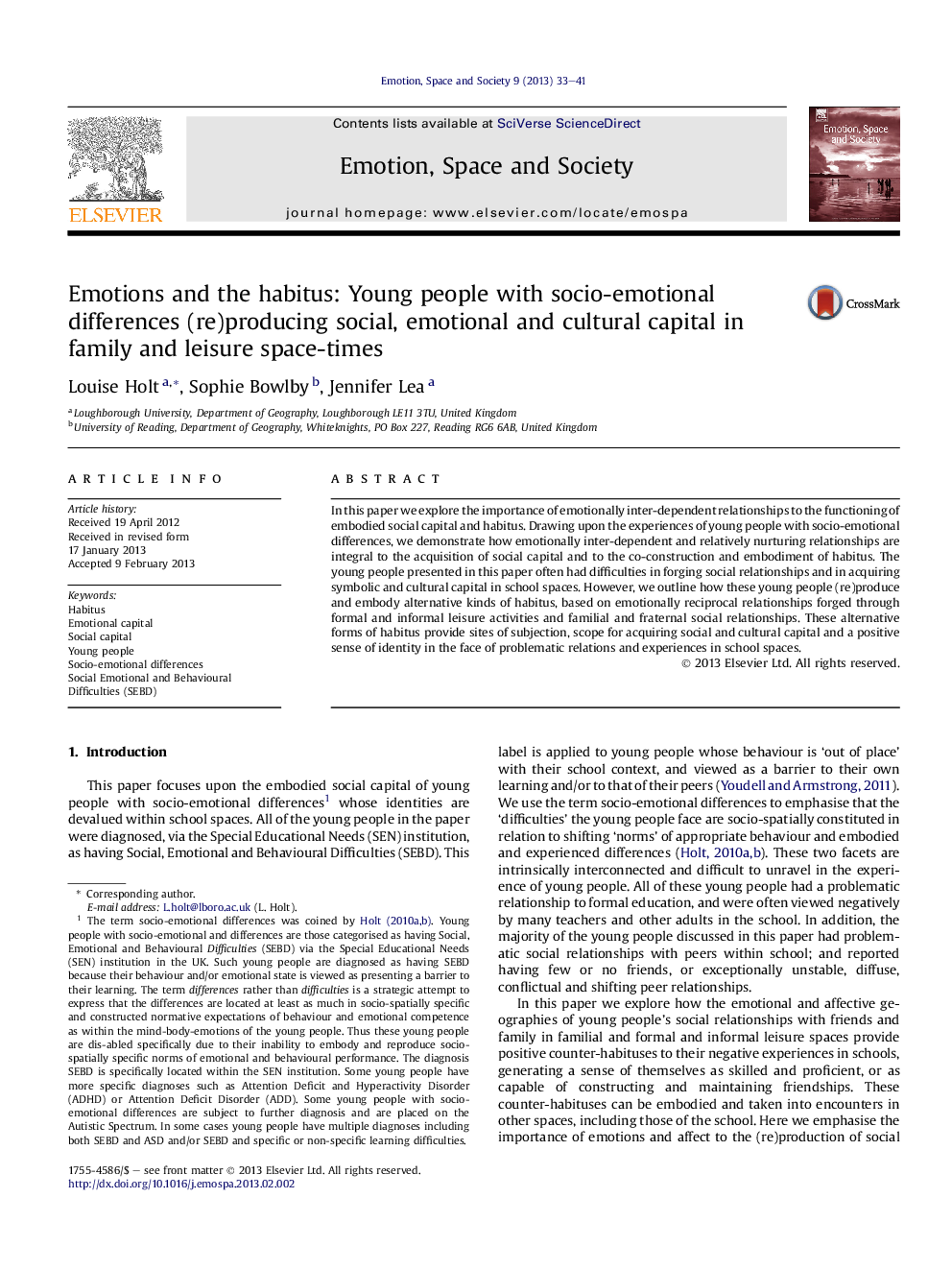| کد مقاله | کد نشریه | سال انتشار | مقاله انگلیسی | نسخه تمام متن |
|---|---|---|---|---|
| 7323420 | 1475638 | 2013 | 9 صفحه PDF | دانلود رایگان |
عنوان انگلیسی مقاله ISI
Emotions and the habitus: Young people with socio-emotional differences (re)producing social, emotional and cultural capital in family and leisure space-times
ترجمه فارسی عنوان
احساسات و عادت: جوانان با اختلافات اجتماعی و احساسی (دوباره) ایجاد سرمایه اجتماعی، عاطفی و فرهنگی در فضای زمان خانواده و اوقات فراغت
دانلود مقاله + سفارش ترجمه
دانلود مقاله ISI انگلیسی
رایگان برای ایرانیان
ترجمه چکیده
در این مقاله، اهمیت روابط عاطفی وابسته به وابستگی به کارکرد سرمایه اجتماعی تجسم و عادت را بررسی می کنیم. با توجه به تجربیات جوانان با تفاوت های اجتماعی-احساسی، ما نشان می دهیم که چگونه روابط عاطفی وابسته و نسبتا پرطرفدار، جدایی ناپذیری در دستیابی به سرمایه اجتماعی و همکاری ساختاری و تجسم عادت است. جوانانی که در این مقاله ارائه شده بودند، اغلب در ایجاد روابط اجتماعی و کسب سرمایه نمادین و فرهنگی در فضاهای مدرسه مشکل داشتند. با این حال، ما مشخص میکنیم که چگونه این جوانان (دوباره) تولید و مظنون انواع دیگری از عادت، بر اساس روابط عاطفی متقابل ساخته شده از طریق فعالیت های اوقات فراغت رسمی و غیر رسمی و روابط اجتماعی خانوادگی و برادرانه است. این اشکال جایگزین عادت ها، مکان هایی را برای تسویه، محدوده برای کسب سرمایه و فرهنگ اجتماعی و هویت مثبت در مواجهه با روابط و تجربه های فاحشی در فضاهای مدرسه فراهم می کند.
موضوعات مرتبط
علوم انسانی و اجتماعی
روانشناسی
روانشناسی اجتماعی
چکیده انگلیسی
In this paper we explore the importance of emotionally inter-dependent relationships to the functioning of embodied social capital and habitus. Drawing upon the experiences of young people with socio-emotional differences, we demonstrate how emotionally inter-dependent and relatively nurturing relationships are integral to the acquisition of social capital and to the co-construction and embodiment of habitus. The young people presented in this paper often had difficulties in forging social relationships and in acquiring symbolic and cultural capital in school spaces. However, we outline how these young people (re)produce and embody alternative kinds of habitus, based on emotionally reciprocal relationships forged through formal and informal leisure activities and familial and fraternal social relationships. These alternative forms of habitus provide sites of subjection, scope for acquiring social and cultural capital and a positive sense of identity in the face of problematic relations and experiences in school spaces.
ناشر
Database: Elsevier - ScienceDirect (ساینس دایرکت)
Journal: Emotion, Space and Society - Volume 9, November 2013, Pages 33-41
Journal: Emotion, Space and Society - Volume 9, November 2013, Pages 33-41
نویسندگان
Louise Holt, Sophie Bowlby, Jennifer Lea,
